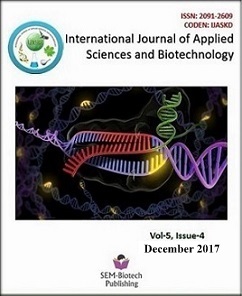A Case Study on Ascites of Hepatic Origin and Their Proper Management in a Male German Shepherd Dog
DOI:
https://doi.org/10.3126/ijasbt.v5i4.18768Keywords:
ascites, dog, biochemical, SAAG, hepaticAbstract
A male German shepherd dog of 11 months was presented to HART Clinic, Pokhara with the history of abdominal swelling, respiratory distress, lethargy, anorexia and weakness. Physical examination revealed dyspnea, pale mucous membrane, and undulating movement (thrills) of fluid on tapping the abdomen. Fecal sample collected for assessing the severity of endoparasites which was found negative. The hematological study showed an increase in numbers of neutrophils, while there were decreased erythrocytes and hemoglobin concentration. The biochemical analysis resulted in an elevated SGOT, SGPT level but decrease in total protein level. Ascitic fluid collected from abdominal paracentesis on examination revealed transudate fluid with serum-albumin ascetic gradient (SAAG) >1.1 gm/dl suggesting ascites due to portal hypertension (96% accuracy) caused by Liver cirrhosis. The dog was diagnosed as ascites of hepatic origin resulting portal hypertension and hypoproteinemia. The abdominocentesis was performed to drain the ascetic fluid followed by albumin and normal saline administration. The dog was further treated with antibiotic, diuretic, amino acid and liver tonics along with protein rich but salt free diet. The dog showed remarkable improvement with gradual reduced in abdominal distention and normalization of the appetite after 7 days of treatment.
Int. J. Appl. Sci. Biotechnol. Vol 5(4): 555-558




